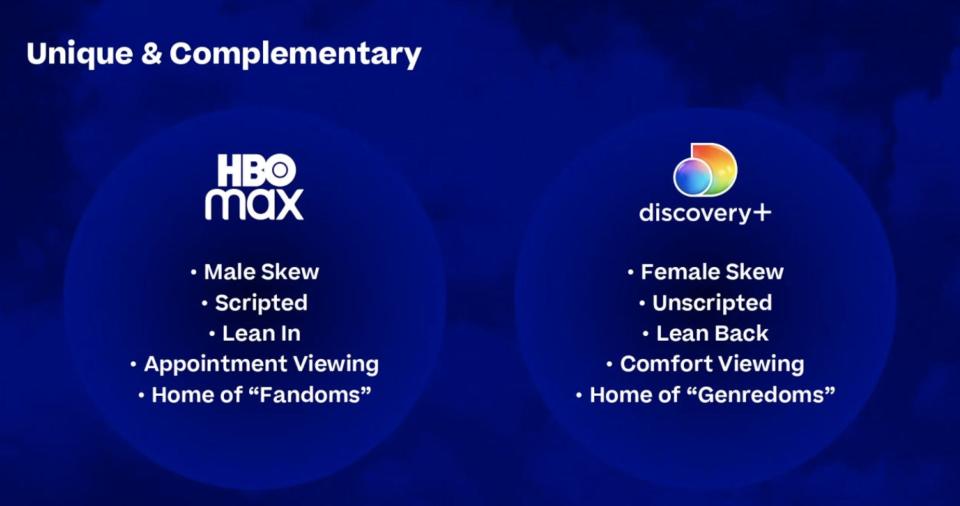HBO Max 'skews male' and has 'appointment viewing,' while Discovery+ 'skews female' and has 'comfort viewing'. This graphic shows how the services differ ahead of their merging next summer.

HBO Max and Discovery+ will be combined into one service.
Warner Bros. Discovery announced it's aiming to launch the new streaming service in summer 2023.
It laid out how the services appeal to different demographics, and would complement eachother.
It was inevitable: HBO Max and Discovery+ are combining.
Warner Bros. Discovery announced details about the plan during its Q2 earnings call on Thursday, its first quarter as a company. The move has been widely expected since WarnerMedia and Discovery completed its blockbuster merger earlier this year.
The company plans to launch the new service first in the US next summer. It's aiming to gain 135 million global subscribers by 2025. It didn't announce any pricing details.
But Warner Bros. Discovery did detail how it views each service, and how they would complement each other.
It said that HBO Max skews male, specializes in scripted content and appointment viewing, and is the "home of fandoms."
Discovery+, meanwhile, skews female, focuses on unscripted programming and comfort viewing, and is about "genres" more than "fandoms."

Max initially struggled to convert existing HBO subscribers when it launched, but has since established itself as a streaming power player. Max added 3 million subscribers in the first quarter of the year, its final quarter under previous corporate parent AT&T — bringing the total combined Max and HBO customers to 76.8 million. Discovery had reported that Discovery+ had 24 million subscribers by the end of Q1.
But on Thursday, Warner Bros. Discovery reported that it had 92.1 million subscribers across all of its platforms (HBO, Max, and Discovery+) and didn't break down the numbers by service. By end of Q1, the services would have had more than 100 million subscribers combined.
Warner Bros. Discovery said this was because it didn't include "10 million legacy Discovery non-core subscribers and unactivated AT&T mobility subscribers from the Q1 subscriber count." Based on that, the company said it added 1.7 million global subscribers in the quarter.
Currently, Max costs $15 per month for the ad-free plan and $10 per month for the ad-supported plan. Discovery+ costs $7 for its ad-free plan and $5 for the ad-supported one.
Combining the two services would make for an even more formidable streamer, adding Discovery's expansive library of unscripted content with Max's collection of prestige TV and movies.
Speculation about Max's future swirled this week, though.
Variety reported that six exclusive movies were quietly removed from the service this week (they're still available to rent at video-on-demand platforms). And Warner Bros. Discovery canceled the release of a "Batgirl" movie that was intended for Max.
The decisions reflect how Warner Bros. Discovery's streaming strategy is much different than the WarnerMedia regime: fewer straight-to-streaming movies and more theatrical releases.
On the Thursday earnings call, CEO David Zaslav said that the company "will fully embrace theatrical" because it "creates word-of-mouth buzz as movies transition from streaming and beyond."
The company is also looking to cut costs wherever possible to appease Wall Street, and is expected to take a tax writedown on "Batgirl," which cost $90 million to make, according to Variety and The Hollywood Reporter.
But based on the timeline laid out by Warner Bros. Discovery on Thursday, it seems like Max won't be changing too drastically any time soon.
Read the original article on Business Insider

